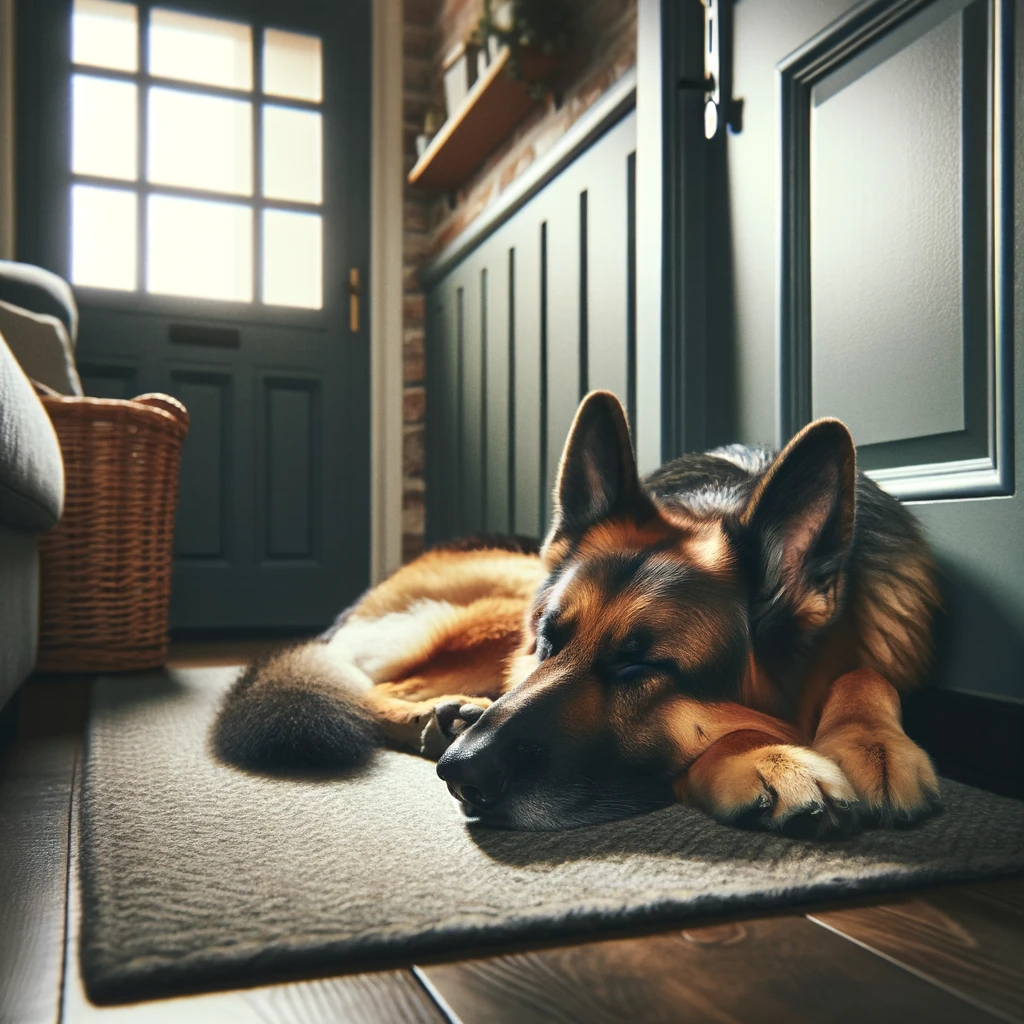Why Does My German Shepherd Sleep By The Door

Your German Shepherd likely sleeps by the door due to its protective instincts, ensuring it can watch for threats to its home and family.
Additionally, this behavior could be influenced by the breed’s intelligence and alertness, making it prefer strategic spots like the door to stay aware of its surroundings.
Facts Why German Shepherd Sleeps By The Door
Understanding why a particular German Shepherd sleeps by the door requires observing the dog’s behavior, environment, and routine.
Each dog may have unique reasons influenced by its personality, training, and experiences.
Here are some well-explained facts about why this might happen:
- Protective Instincts: German Shepherds are bred for their protective nature. This breed has been used for tasks requiring vigilance and guardianship, like police and military roles. Sleeping by the door allows them to monitor and guard the house’s main entrance, fulfilling their instinctual role as protectors.
- Breed Characteristics and Intelligence: Known for their intelligence and alertness, German Shepherds may sleep by the door to keep tabs on the environment. This spot allows them to respond to unusual noises or potential threats, ensuring they are the first to know about any disturbances.
- Separation Anxiety or Attachment: Some German Shepherds may sleep by the door due to separation anxiety or strong attachment to their owners. This behavior might indicate they are waiting for their owner to return or are uneasy about being separated from them, especially if the door is a frequent point of exit and entry.
- Environmental Preferences: The area by the door might have particular environmental factors that appeal to the dog. It could be cooler or offer a comfortable draft, especially on a hard surface like tile. Some dogs also prefer a clear view of their surroundings, and sleeping by the door provides this.
- Health and Comfort: In some cases, changing sleeping habits, like moving to sleep by the door, could indicate health issues. It’s always a good idea to rule out any medical problems with a veterinarian if sudden behavior changes occur.
- Routine and Habit: Dogs are creatures of habit. If a German Shepherd starts sleeping by the door and it becomes part of their daily routine, they might continue doing so out of habit, even if the original reason for the behavior changes.
- Social Behavior and Pack Mentality: Dogs, being pack animals, often like to position themselves in places where they can monitor the activities of their ‘pack,’ in this case, their human family. Sleeping by the door might be a way to ensure they are not left out or abandoned.
Protecting Your Home: The German Shepherd’s Instincts
German Shepherds are famous for their strong protective instincts, making them excellent at keeping homes safe.
They are smart and always alert, noticing if something unusual happens around your house. This breed was bred for herding and guarding, so they watched over their family and territory.
Their loyalty and bravery mean they will do their best to protect you and your home from danger.
Here are some reasons why German Shepherds protect your home.
- Bred for Protection: German Shepherds were bred for herding and guarding, making protection an instinct.
- High Intelligence: They are intelligent, allowing them to assess situations and react to protect their home and family.
- Loyalty to Family: Known for their loyalty, German Shepherds often form strong bonds with their families, motivating them to be protective.
- Strong and Agile: Their physical strength and agility enable them to deter intruders or respond to threats.
- Alertness: German Shepherds are alert and have a keen sense of hearing, making them quick to respond to unfamiliar sounds or activities.
- Training Ability: They are trainable, which means they can be taught specific protection behaviors and commands to guard the home better.
- Territorial Nature: As a breed, they are known to be territorial, often taking on the role of a guardian for their home space.
- Sense of Duty: German Shepherds often display a strong sense of duty and responsibility, which includes protecting their home environment.
Stopping Your German Shepherd from Sleeping by the Door
Remember, changing a dog’s behavior takes time and patience. Be consistent with your approach, and give your German Shepherd lots of love and understanding as they adjust to the new routine.
Here is how to stop your German Shepherd from sleeping by the door.
- Create a Cozy Sleeping Area: Make another spot in your home very comfy for your dog. Use a soft bed and their favorite toys to encourage them to sleep there instead.
- Positive Reinforcement: Give your German Shepherd treats and lots of praise when they use their new sleeping spot. This will help them understand that sleeping there is a good thing.
- Routine and Consistency: Dogs love routines. Try to encourage them to sleep in the new spot at the same time every night.
- Keep the Door Area Less Appealing: If your dog likes the door because it’s cool, try to make it less attractive. Close the door so they can’t see out, or keep the area warm.
- Address Separation Anxiety: If your dog sleeps by the door because they miss you, work on reducing their anxiety. Spend quality time with them and consider talking to a vet or a dog behaviorist for more help.
- Training Commands: Teach your dog a command like “go to bed” to direct them to their new sleeping area. Use treats and praise to reinforce this behavior.
- Exercise and Playtime: Ensure your German Shepherd gets plenty of exercise and playtime during the day. A tired dog is more likely to sleep in their bed.
Summary of “Why Does My German Shepherd Sleep By The Door”
German Shepherds often sleep by the door due to their protective instincts and intelligence.
Reasons for this behavior include their routine, habits, environmental preferences, and a strong attachment to their owners.
Some German Shepherds might also sleep there due to separation anxiety or as part of their pack mentality.
Creating a cozy sleeping area elsewhere, using positive reinforcement, and maintaining a consistent routine can help discourage this habit.
Addressing any underlying separation anxiety and ensuring they get plenty of exercise is also essential. Remember, patience and consistency are key when changing your dog’s behavior.

I’m Martin, and I grew up in the super cool city of Seattle. You know, the place with all the incredible mountains and forests? Yeah, that’s my playground!
Ever since I was little, I’ve been all about nature. I used to wander around the woods with a notebook, doodling all the cool plants and animals I’d find.
